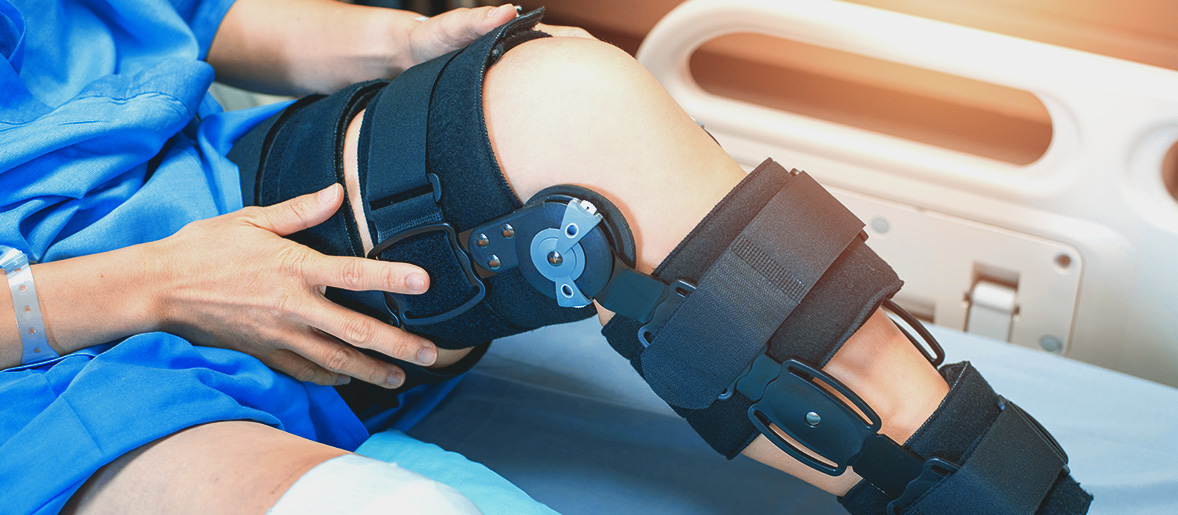SERIOUS INJURIES

Knee Injury
Car accidents, motorcycle collisions, and slip and falls result in various injuries. One of the most common injuries is a knee injury. Typical injuries include ligament tears, sprains, and patella fractures. The knee provides strength and mobility, and therefore is essential to numerous daily functions, such as walking. As such, knee injuries are painful, require immobilization, and drastically change the quality of life. In fact, some serious knee injuries cause long-term or chronic issues. These injuries can clearly result in substantial medical bills, lost income, disability, and pain and suffering. The experienced attorneys at Slatter Law Firm will aggressively fight to recover the maximum compensation for your injuries.
The knee is the largest joint in the body. It connects the femur (thigh bone) to the tibia (shin bone), and also consists of the patella (kneecap), fibula, and tendons, which connect the knee to the surrounding muscles. In car accidents and falls, knee injuries occur due to a direct blow to the knee, abnormal twisting or bending of the knee, or by directly falling on your knees. Accidents and falls result in various knee injuries. Below are common knee injuries along with their symptoms and typical medical treatment.
Fractures to the patella or kneecap are common injuries for falls and accidents. The impact of the knee striking the dashboard or the trauma from falling onto your knees causes the patella to fracture. The patella can break in various ways: breaking into two clean pieces or into many pieces. General symptoms for a patellar fracture include pain and swelling in the knee, difficulty with walking, and inability to straighten the knee. Treatment depends on the type and severity of the fracture. If your doctor determines that the fracture is not displaced, a cast or splint will be recommended. However, if the fracture is displaced, surgery is necessary. Rehabilitation is typically recommended for either type of fracture.
The meniscus is the cartilage in the knee that stabilizes the knee joint. It essentially protects your bones from wear and tear. Meniscus tears are caused by forceful twisting or rotating of the knee. The injury can be extremely painful and debilitating. Symptoms include pain and swelling in the knee, troubling straightening and bending your leg, popping feeling, and locked knee. Treatment depends on the size and location of the tear. Conservative treatment includes rest, icing your knee, compressing the knee to decrease inflammation, anti-inflammatory medication, and elevating the knee. If this treatment is unsuccessful in managing your pain, or your knee is unstable or tends to lock, surgery may be recommended. Recovery time from surgery may be 4 to 6 weeks.
The anterior cruciate ligament (ACL) connects the femur to the tibia, and controls the back and forth motion of the knee. When the ACL is torn in an accident or fall, people typically hear or feel a pop in their knee. Symptoms include severe pain and rapid swelling in the knee, difficulty with walking, knee instability, and loss of range of motion. Treatment depends on the severity of the injury. For minor tears, treatment may consist of rest, applying ice, compressing the knee, anti-inflammatory medication, medication, elevating the knee, and several weeks of rehabilitative therapy. If the ACL tear is severe or your knee gives way when walking, surgery will be required. Extensive rehabilitation is necessary, and full recovery can take up to 9-12 months.
A knee sprain occurs when the ligaments in the knee are overstretched. Symptoms of a knee sprain depend on which ligament is sprained. For an ACL sprain, you may hear a pop at the time of injury. For a posterior cruciate ligament (PCL) sprain, symptoms include pain in the back of the knee. For medial collateral ligament (MCL) and lateral collateral ligament (LCL) sprains, symptoms include the knee feeling as if it is buckling from the opposite direction from the injured ligament. Other general symptoms for any type of knee sprain include swelling, bruising, tenderness, muscle spasms, and stiffness. Treatment depends on the severity of the injury. Typical treatment consists of rest, applying ice, compressing the knee, elevating the knee, and rehabilitative therapy. Most people heal from these knee sprains within 4 weeks. However, some people with ACL or PCL sprains can develop arthritis in the knee over time.
If you experience a knee injury after your accident or fall, you should seek immediate medical attention.
Contact Us Today
Contact a Los Angeles personal injury attorney today if you or a loved one was involved in an accident involving a dangerous road condition. Slatter Law Firm has been helping individuals injured due to car accidents and slip and falls throughout Los Angeles and Southern California for over four decades. To schedule a free consultation, call our office at (310) 405-0964 or contact us online.
Disclaimer
Slatter Law Firm are lawyers, not physicians. All content is based on our experience and not on medical education. If you are experiencing any physical injury consult with a doctor.






